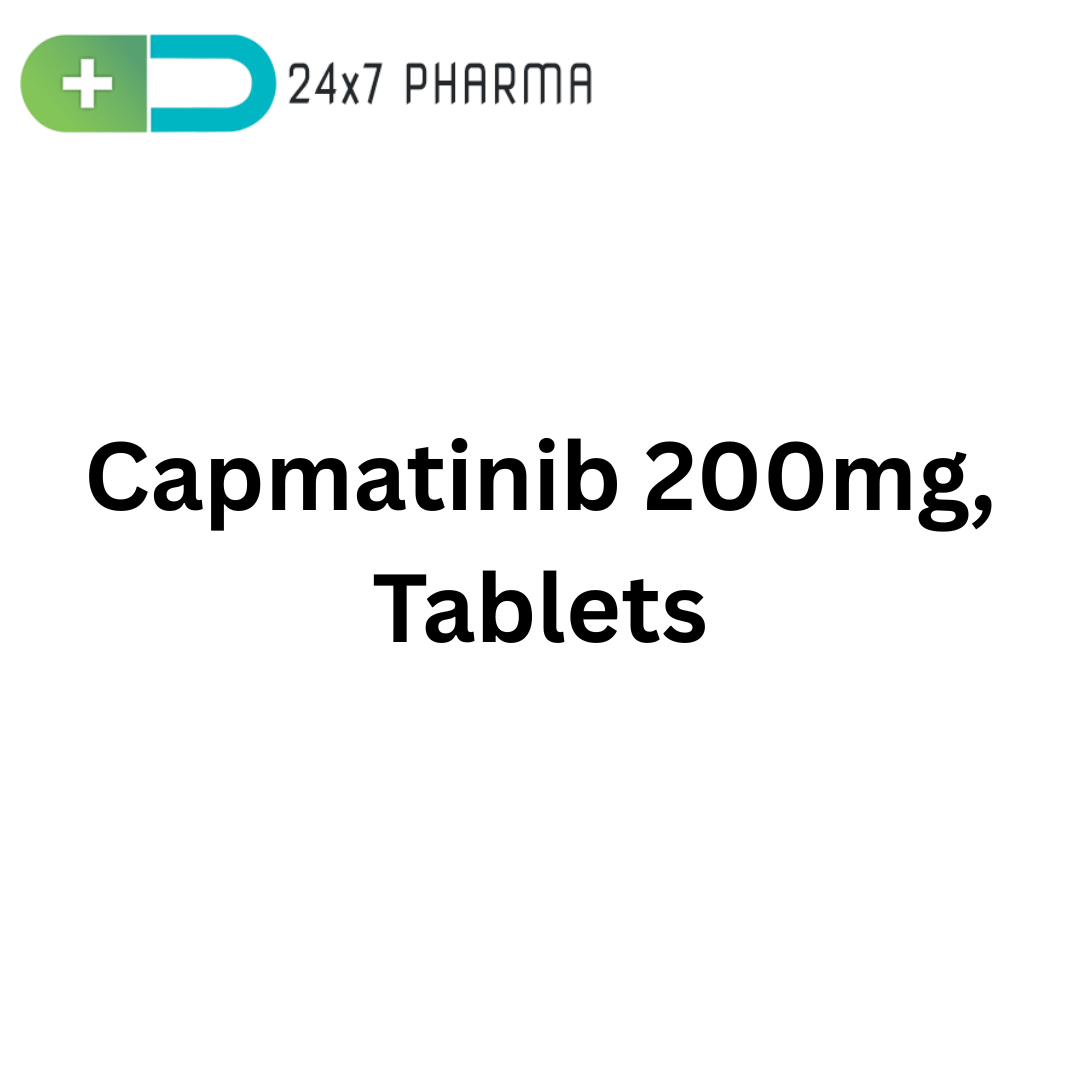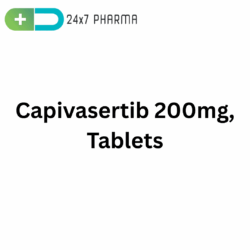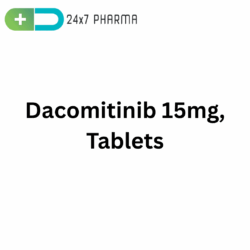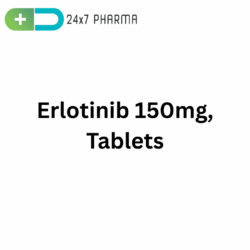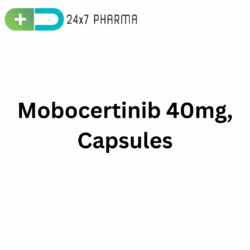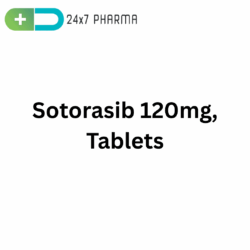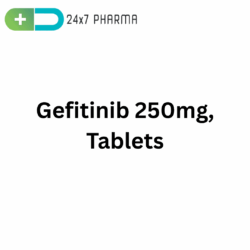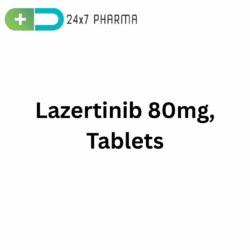Lucicapma 200mg, Capmatinib Tablets
Non-small cell lung cancer (NSCLC) is the main condition treated with LuciCapma 200mg, an advanced targeted cancer therapy that contains the active ingredient capmatinib. It belongs to a class of drugs known as MET kinase inhibitors, which target specific genetic mutations responsible for uncontrolled cancer growth. Manufactured as an oral tablet, LuciCapma is part of personalized medicine approaches, offering treatment specifically for patients whose tumors have a MET exon 14 skipping mutation.
What is LuciCapma 200mg (Capmatinib)?
LuciCapma 200mg is a prescription anticancer medication designed to inhibit the MET (mesenchymal-epithelial transition) receptor tyrosine kinase, which is overactive in certain types of cancer. Capmatinib is the first FDA-approved therapy for adult patients with metastatic NSCLC harboring a MET exon 14 skipping mutation. This mutation leads to excessive MET signaling, contributing to tumor growth and spread. By inhibiting this pathway, Capmatinib helps control the disease more effectively.
How it Works / Mechanism of Action
Capmatinib works by selectively targeting and inhibiting MET kinase, a protein encoded by the MET gene. In normal cells, MET is involved in cell growth, survival, and repair. However, in NSCLC with MET exon 14 skipping mutations, the MET signaling becomes overactive, leading to uncontrolled cancer cell proliferation, invasion, and metastasis.
Capmatinib binds to the ATP-binding site of the MET receptor, blocking downstream signaling pathways like RAS/MAPK, PI3K/AKT, and STAT, which are crucial for cancer cell survival and division. By halting this process, Capmatinib effectively induces cancer cell death and slows tumor progression.
How to Use / Indications
LuciCapma is indicated for:
- Adults with metastatic non-small cell lung cancer (NSCLC) that is positive for MET exon 14 skipping mutations, detected through an FDA-approved test.
- individuals whose cancer has spread or who are unable to withstand immunotherapy or conventional chemotherapy.
- It’s essential to confirm the presence of the MET exon 14 mutation through biomarker testing before initiating therapy.
How to Take / Dosage
Recommended Dosage:
- Capmatinib 400 mg orally twice daily (i.e., two 200 mg tablets twice a day).
- Can be taken with or without food.
- Swallow tablets whole with a glass of water. Do not crush, chew, or split the tablets.
- Treatment Duration: Continue until disease progression or unacceptable toxicity. Dose adjustments may be necessary based on side effects or liver function.
Other Dosages
LuciCapma is commonly available in:
- Capmatinib 200 mg tablets (standard strength).
- A lower strength 150 mg or 100 mg may be used in certain regions or clinical settings, especially for dose modifications based on tolerance.
Dose reductions may follow a stepwise approach:
- 400 mg twice daily
- 300 mg twice daily
- 200 mg twice daily
- depending on adverse event management.
Side Effects
LuciCapma may have adverse effects, just as any targeted treatment.These vary in intensity and may require medical management or dosage adjustment.
Common Side Effects:
- Peripheral edema (swelling, especially in legs and feet)
- Nausea and vomiting
- Fatigue
- Shortness of breath
- Elevated liver enzymes (ALT, AST)
- Decreased appetite
Serious Side Effects:
- Interstitial Lung Disease (ILD)/Pneumonitis – May cause cough, dyspnea, and fever; requires immediate discontinuation.
- Hepatotoxicity: Liver function must be regularly monitored.
- Patients who are photosensitive should wear sunscreen and restrict their sun exposure.
- Renal impairment – May require dose adjustments.
Storage
- Store below 30°C (86°F) in a dry place.
- To shield against light and moisture, keep in the original blister pack or container.
- Keep out of reach of children.
- After their expiration date, the tablets should not be taken.
Benefits
- LuciCapma offers several distinct advantages for eligible cancer patients:
- NSCLC with mutations that bypass MET exon 14 is treated with targeted treatment.
- Non-Chemotherapy Option: Less toxic than traditional chemotherapy, with manageable side effects.
- Oral Administration: Convenient, at-home dosing.
- Improved Progression-Free Survival: Clinical trials show higher response rates and better disease control.
- Personalized Medicine: Allows tailored treatment based on genetic testing.
Prescription
LuciCapma is a prescription-only medication and should be prescribed by an oncologist or specialist based on molecular diagnostic testing.
Prerequisites:
- NSCLC with a verified MET exon 14 skipping mutant diagnosis
- Comprehensive clinical assessment including liver, kidney function, and overall patient status
- Regular monitoring during therapy
Interaction
Capmatinib may interact with other drugs, especially those affecting liver enzymes:
CYP3A4 Inhibitors (may increase Capmatinib levels):
- Ketoconazole
- Itraconazole
- Clarithromycin
CYP3A4 Inducers (may decrease Capmatinib levels):
- Rifampin
- Carbamazepine
- Phenytoin
- St. John’s Wort
Other Drug Interactions:
- Drugs causing QT prolongation – Use cautiously as Capmatinib may also prolong QT interval.
- P-gp substrates – Capmatinib may affect the exposure of these agents.
- Avoid grapefruit juice, as it may increase Capmatinib concentration in the blood.
Always inform your healthcare provider about all medications, including OTC drugs and supplements.
FAQs
Who can take LuciCapma (Capmatinib)?
Only adults diagnosed with metastatic NSCLC with a confirmed MET exon 14 mutation via a validated test.
If I miss a dose, what should I do?
Take the missed dose as soon as you remember unless it’s less than 6 hours before the next dose. Do not double up.
Is LuciCapma chemotherapy?
No, it is a targeted therapy, not traditional chemotherapy.
Can LuciCapma cure cancer?
It is not a cure, but it helps control cancer growth and improve quality of life and survival.
Conclusion
LuciCapma 200mg (Capmatinib) represents a significant advancement in precision oncology, offering hope to patients with a rare but actionable genetic mutation in lung cancer. As a selective MET inhibitor, it blocks abnormal signaling that drives tumor growth in MET exon 14-altered NSCLC, providing a personalized and effective treatment option. While it comes with potential side effects, careful monitoring and dose adjustments make it a valuable therapeutic tool in the fight against advanced lung cancer. Always consult your healthcare provider to ensure it’s the right choice based on your condition, test results, and overall health.

